Thursday 21 March (16:00) passholders only CCA Cinema // 1h20m // 15+
Friday 22 March (18:30) GFT Cinema 3 // 1h45m // 15+
Sunday 24 March (13:15) GFT Cinema 3 // 1h45m // 15+
Revolutionary acts drive the fifth Bill Douglas Award programme, so we pay homage to Frantz Fanon in its title. In Suddenly TV we are taken into an important moment in Sudan’s ongoing struggle for liberation through the eyes of young revolutionaries, while the eco-resistance leaders in Terra Mater, clad in electronic waste, highlight colonial and capitalist damage through an Afro-futurist lens. The Medallion is a cross-generational British diaspora perspective on Ethiopia’s Red Terror, explored through archives and family testimony. GSFF alumna Maryam Tafakory returns with her stunning newest short Mast-del, a poetic and experimental film essay ruminating on love, censorship and desire, and we end with a defiant bang in Blinded by Centuries, a new generation’s radical imaginations of the past, present and future, infused by music video sensibilities.
Book your tickets on our website here.
Suddenly TV
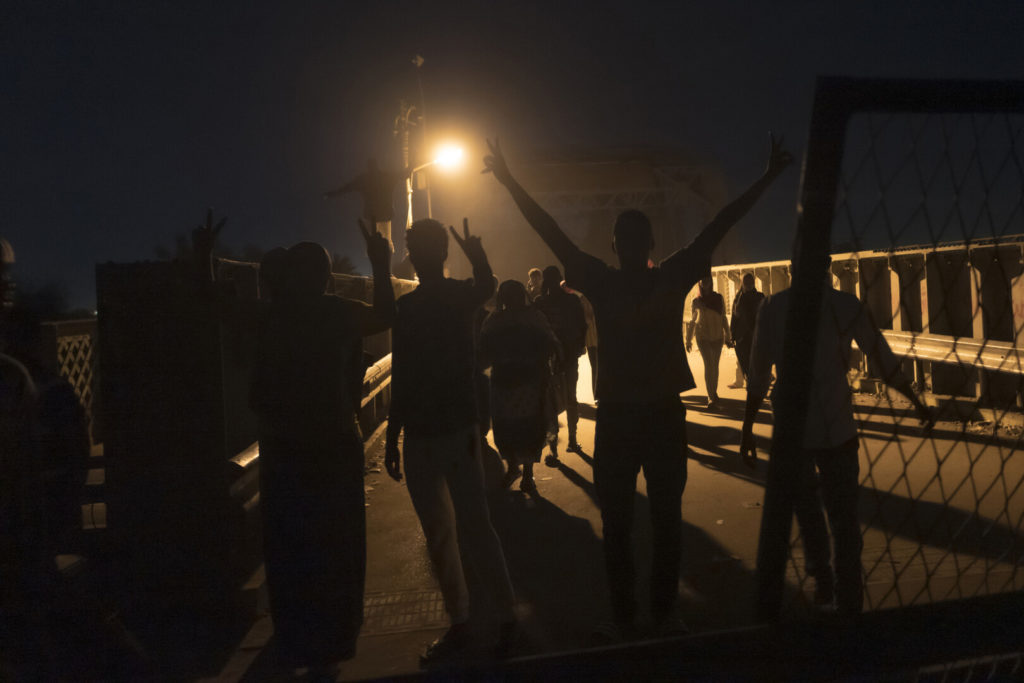
Sudan, Qatar // 2022 // 19 mins
At a besieged protest in Khartoum, a group of young Sudanese create an imaginary television station to meet fellow revolutionaries. What begins as play becomes an urgent conjuring of a new Sudan.
What do we do in the face of increasing media censorship, epistemic violence and institutional neglect? A group of young Sudanese men build their own TV station with cardboard cameras and plastic bottle microphones and head to the streets. In cinéma-vérité style, they start documenting the 2019 Sudanese civilian sit-in against the military rule in the capital Khartoum. Starting as a playful revolt, their TV station suddenly turns into a dynamic tool reclaiming the power of the camera and a yearning for democracy that gives voice to the demands of ordinary people. While we follow them roaming the roads and interviewing people at the heart of the revolution, a larger picture emerges through the camera of the film, capturing the networks and solidarity that are born through nonviolent disobedience. We hear rhythmic banging and chants, people singing together, sharing food and natural resources – webs of support and communal care are fostered in front of our eyes. In these pressing times, Suddenly TV acts as an urgent call to turn to our collective power in the face of immense brutality and oppression that still pertains to both Sudan and beyond.
Milda Valiulytė
Terra Mater
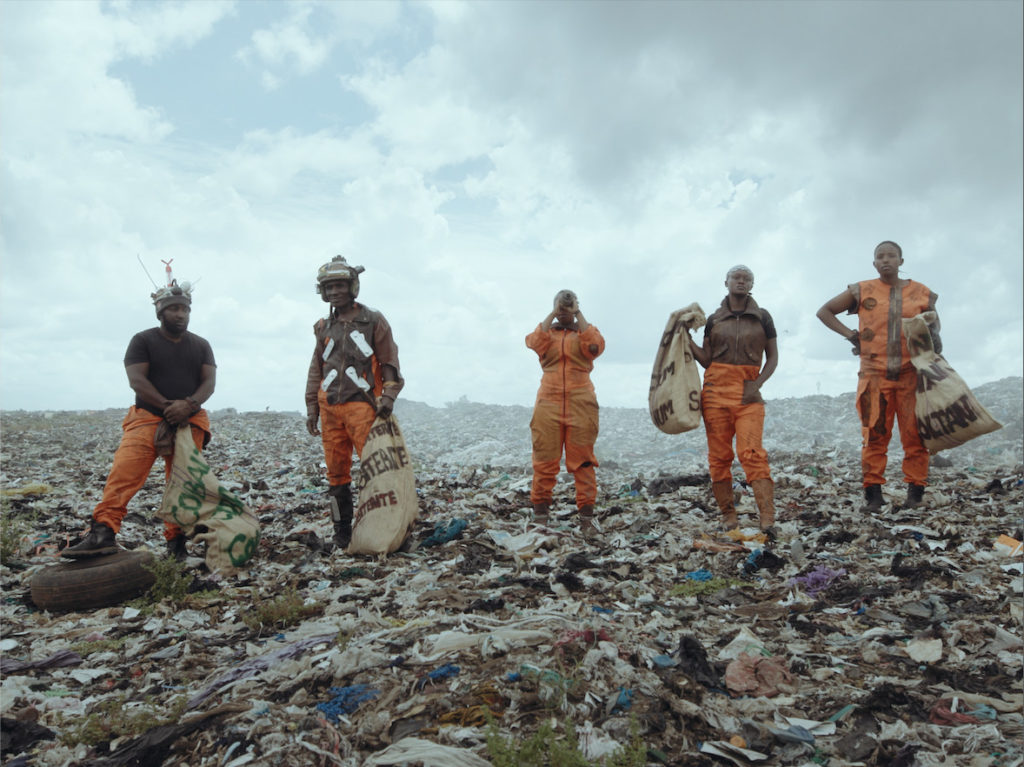
Rwanda // 2023 // 10 mins
For our land and bones. At the end of the world. Technology and waste, in our lands, our systems, our bones. Wandering our spaces, she cannot help but wonder, where is the space for healing?
In her essay The Visual Frequency of Black Life, Tina Campt describes still-moving-images as images ‘that hover between still and moving images; animated still images, slowed or stilled images in motion, or visual renderings that blur the distinctions between these multiple genres; images that require the labor of feeling with or through them.’ In Terra Mater, the images of ecological ruin and portraits of people linger somewhere between this movement-stillness continuum which Campt speaks of. We are witness to the labour of excavators who search and gather materials in the name of extraction, as the film gestures towards a technological future that holds tensions between the land, its people and ongoing colonial destruction. What does the slowing of an image do to a film? As a medium bound with time, could it be part of a refusal, or an alternative way of seeing, where our breath is mirrored with and through extended shots that also breathe, more than just viewing, but instead felt through our bodies?
Natasha Ruwona
The Medallion
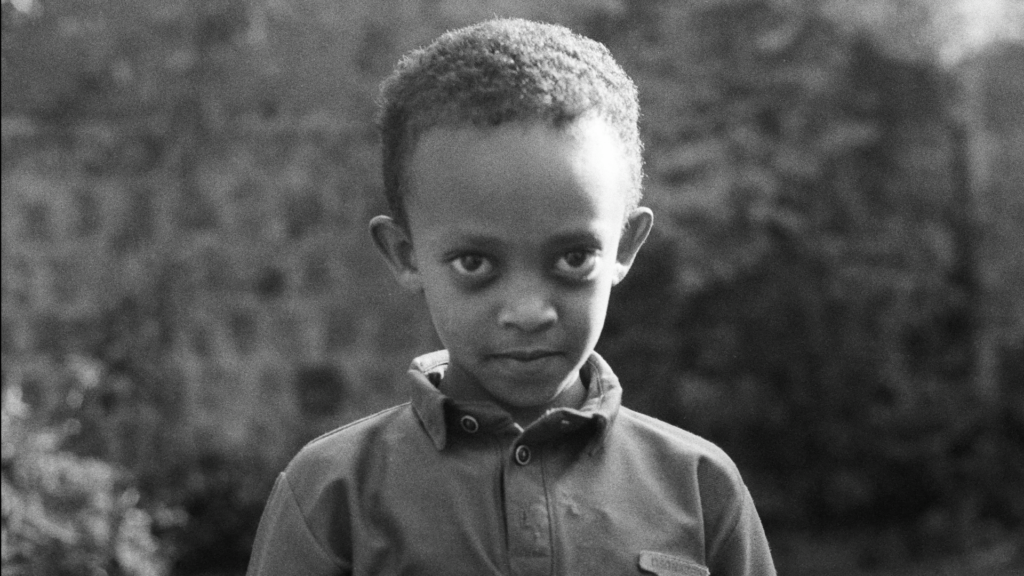
United Kingdom // 2023 // 19 mins
A single piece of jewellery can hold the story of generations. Ruth was barely a teenager when her mother passed down a medallion. Together, they travel to Ethiopia to explore her mother’s story as a survivor of the Red Terror genocide.
The Medallion is a documentary by Ruth Hunduma whose mother, Tsehay, shares her memories of living through Ethiopia’s Red Terror. The documentary explores the campaign of systemic violence and suppression enacted by Ethiopia’s military dictatorship of the 70s and 80s, through Tsehay’s experience of surviving indoctrination and torture in one of the country’s prison camps as a teenager. The Medallion is as expressive as it is informative, with elements of poetic spoken word, archival news and home video footage, illustrating the shadow of war and trauma on one family and the filmmaker’s own place in the legacy of this pain. Tsehay and her family’s story is the root of The Medallion, through which the wider socio-political context of Ethiopia’s Red Terror is elaborated. This testimony guides the viewer through a harrowing part of history that is poorly understood by many outside of the country; it is a frank and generous contribution to fellow survivors of the war. Hunduma leaves us with a reminder of the deadly 2020 war in Tigray, which has left thousands of survivors displaced and facing oppression under the current Ethiopian government.
Naomi Gessesse
Mast-Del
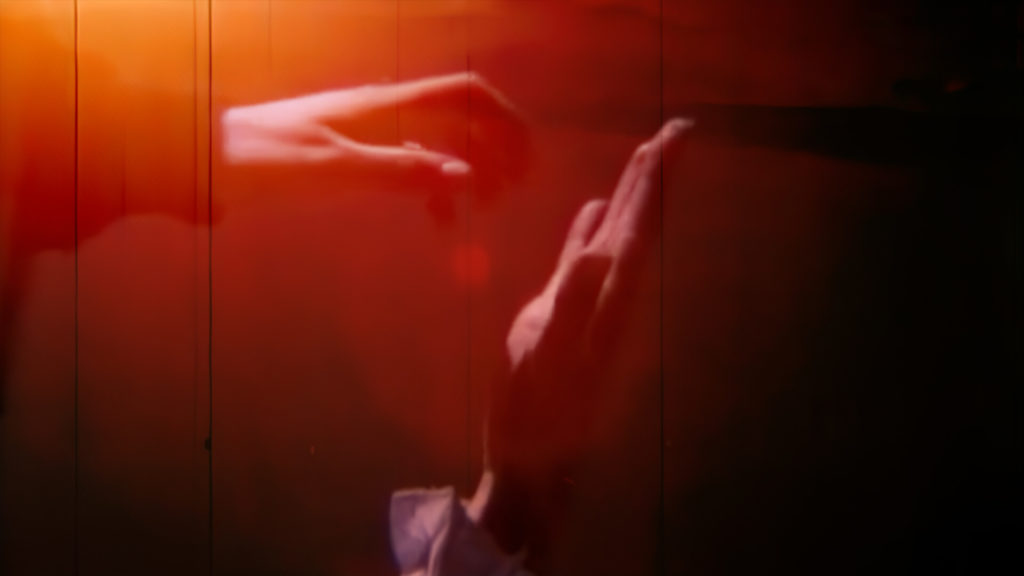
United Kingdom, Iran // 2023 // 17 mins
Two women lie together in bed. As the wind bashes against the window, one recalls a past date to the cinema. A love song that would never pass the censors, about forbidden desires, both inside and outside post-revolution Iranian cinema.
Maryam Tafakory returns to GSFF with a new addition to her mesmerising collection of archival interventions on the themes of censorship, desire and sexuality in postrevolution Iranian cinema and beyond. Weaving together negative – sometimes double-exposed – images, subtle sound design and written narrative, Mast-del opens a door to a tactile, intimate experience of the protagonists’ bodily and mental reality. The sound of a wet storm triggers a memory; the screen overspills with obscured close-up shots of two female bodies yearning for one another. While Tafakory’s last film Nazarbazi felt more like a representation of the Aesopian language of (un)expressed attraction, Mast-del takes it a step further – formally embodying the sense of playfulness and craving that are born in the shadow of restrictions. Watching it, I felt like the screen was inviting me to our own play of glances. The film, withholding the clarity of the image, ignited an urge to know, to touch, to see; to fill in the gaps with my imagination. This exploration is not just about sexual desire, it’s about the erotic power. Following Audre Lorde’s words, it’s about a lifeforce – craving to fully feel and share that feeling in all that we are and do.
Milda Valiulytė
Blinded by Centuries
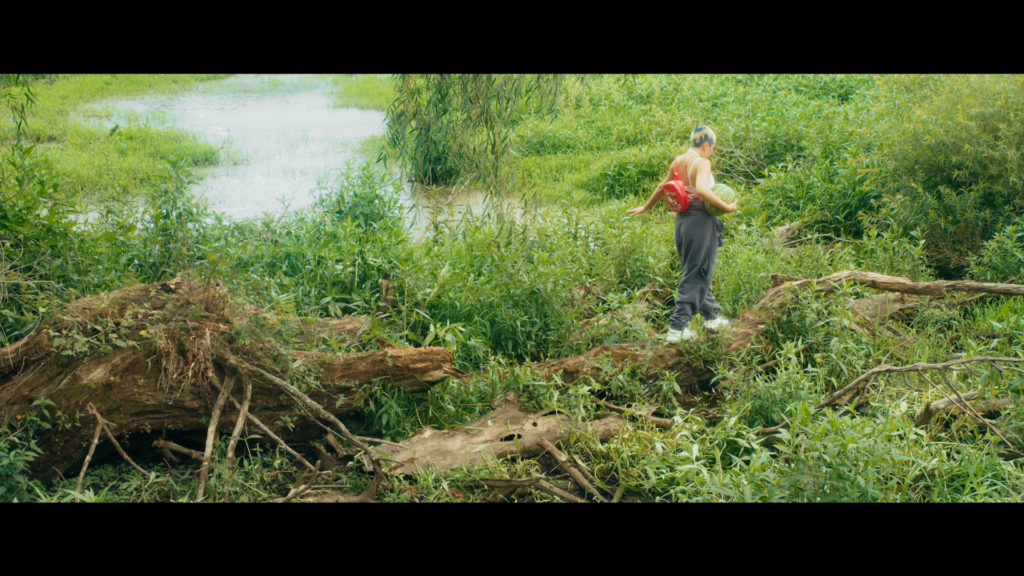
“I was born in a land that was fertile.”
Drawing inspiration from the Buddhist folktale “Twelve Sisters”, filmmaker, Parinda Mai offers a speculative reinterpretation of its moral quandaries which cuts deep to the purpose of humanity on this planet we call earth.
Through an evocative interplay of image and sound, Mai adopts multiple formal approaches that continue to move and adapt, mimicking the ebb and flow of the ever evolving world at the film’s heart. Stationary early scenes, such a sequence in which a woman indulges in a watermelon, are almost portraiture-like, but the space and tone shifts as we move further into Mai’s vision, as images from a zoo are interwoven with images of labs creating artificial meat, drawing connections between animal captivity and the artificial future that might await us.
An innovative and compelling visual experience, and a pointed critique of the impact of globalisation, ongoing technological advancement and systems of oppression that permeate society.
Lauren Clarke